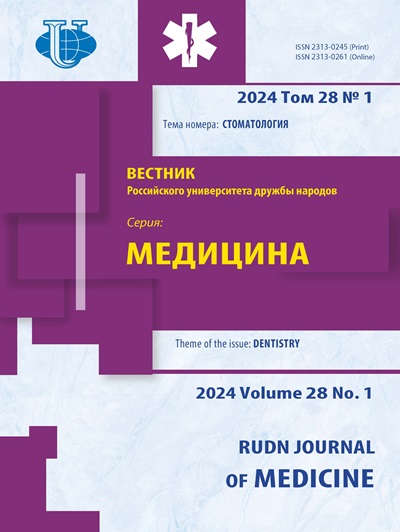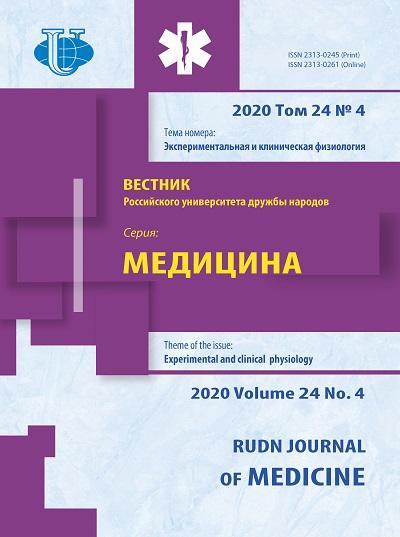Immunopathogenetically reasonable program effectiveness of systemic and local interferonotherapy in immunocompromised young children
- Authors: Nesterova I.V.1,2, Kovaleva S.V.2, Khalturina E.O.3, Chudilova G.A.2
-
Affiliations:
- Peoples’ Friendship University of Russia (RUDN University)
- Kuban State Medical University
- I.M. Sechenov First Moscow State Medical University of the Ministry of Health of the Russian Federation (Sechenov University)
- Issue: Vol 24, No 4 (2020): EXPERIMENTAL AND CLINICAL PHYSIOLOGY
- Pages: 354-367
- Section: CLINICAL PHYSIOLOGHY
- URL: https://journals.rudn.ru/medicine/article/view/25030
- DOI: https://doi.org/10.22363/2313-0245-2020-24-4-354-367
Cite item
Full Text
Abstract
Relevance. In recent years, there has been a steady increase in the incidence of children morbidity, in the structure of which infectious pathology occupies a leading position. The development of «minimal persistent inflammation» of the upper respiratory tract mucosa is the basis for the persistence of microflora, the entrance gate for allergens and irritants, and creates conditions for the timing of the inflammation. The aim of the study: based on the study of the features of the immune system and interferon system in immunocompromised children of early age suffering from co-infections: return ARVI associated with atypical chronic herpes virus infections, to develop a new program of local and systemic interferon therapy and evaluate its effectiveness. Materials and methods: We observed 30 children aged 1-4 years, 16 boys and 14 girls suffering from recurrent ARVI associated with various atypical chronic active herpes virus infections (ACHA-HVI) (HSV I/II, EBV, CMV, HHV VI). The comparison group was 20 conditionally healthy children, comparable by sex and age. We used clinical and immunological methods: ELISA, PCR, cytofluorimetry. Results: A clinical and anamnestic investigation showed that young children had clinical features of immunocomprometization: a high rate of recurrent ARVI of 10-15 or more episodes per year, and the duration of these episodes ranged from 7 to 12 days, while in 100 % of cases there were recurrent monoand/or mixed ACHA-HVI. A study of the state of the immune system and the interferon system showed that children of the study group were deficient in T cytotoxic lymphocytes, natural killer cells, serum IFNα, serum IgA, and various disorders of neutrophil granulocytes (NG). A new immunopathogenetically based program of local and systemic therapy with recombinant IFNα2b in combination with antioxidants has been developed. This program demonstrated a high clinical-immunological effectiveness, providing in a significant reduction of ARVI episode rates, a reduction in the duration of IRVI, as well as the number of complicated ARVI, a decrease in the replicative activity of herpes viruses in a field of restoration of the interferon system, a significant improvement of antiviral and antibacterial immune response. Conclusions: A new immunopathogenetically based program of systemic and local IFNtherapy for immunocompromised young children has been created. The high clinical-immunological effectiveness and immunoprophylactic orientation of the developed local and systemic program of interferonotherapy have been demonstrated.
About the authors
I. V. Nesterova
Peoples’ Friendship University of Russia (RUDN University); Kuban State Medical University
Author for correspondence.
Email: jane_k@inbox.ru
SPIN-code: 4714-2488
Moscow, Russian Federation; Krasnodar, Russian Federation
S. V. Kovaleva
Kuban State Medical University
Email: jane_k@inbox.ru
SPIN-code: 8289-5342
Krasnodar, Russian Federation
E. O. Khalturina
I.M. Sechenov First Moscow State Medical University of the Ministry of Health of the Russian Federation (Sechenov University)
Email: jane_k@inbox.ru
SPIN-code: 2813-4952
Moscow, Russian Federation
G. A. Chudilova
Kuban State Medical University
Email: jane_k@inbox.ru
SPIN-code: 2092-6412
Krasnodar, Russian Federation
References
- Deryusheva A.V., Lvova I.I., Legotina N.S. Program Rationale of Treatment and Prevention in Children with Frequent Respiratory Diseases. Children’s Infections. 2017;1:15–20.
- Gruzdeva О.V., Ulybina Ye.V., Verbianova O.M. Opportunities and mechanisms for compensatory development of frequently sick children of the senior preschool age. Krasnoyarsk State Pedagogical University named after V.P. Astafyev. 2018;3(45):135–145.
- Ivardava M.I. Use of immunomodulators in acute respiratory infection treatment in frequently ill children. Voprosy sovremennoi pediatrii. 2011;3:103–107.
- Babachenko, I.V., Kvetnaya, A.S., Melnik, O.V., Levina, A.S. Pathogenesis of the formation of frequent respiratory illnesses in children having Epstein-Barr virus and cytomegalovirus infection. Infectology Journal. 2011;3(4):67–72.
- Balmasova, I.P., Malova, E.S., Sepiashvili, R.I. Viral and bacterial coinfections as a global issue of the modern medicine. Bulletin of the PFUR. Series: Medicine. 2018;22(1):29–42.
- Baranov A.A., Namazova-Baranova L.S., Lobzin Yu.V., Tatochenko V.K., Uskov A.N., Vakhitov Kh.M. et.al. Interferon inductors in prevention and treatment of respiratory infections in children. Russian Bulletin of Perinatology and Pediatrics. 2019;64(3):103–108. doi: 10.21508/1027–4065–2019–64–3– 103–108.
- Harada Y., Kinoshita F., Yoshida L.M., Minh L.N., Suzuki M., Morimoto K. et.al. Does respiratory virus coinfection increases the clinical severity of acute respiratory infection among children infected with respiratory syncytial virus? Pediatr Infect Dis J. 2013; 32(5): 441–445. doi: 10.1097/INF.0b013e31828ba08c.
- Kankasova M.N., Mokhova O.G., Pozdeeva O.S. Frequently ill children: an infectious disease physician’s view. Practical Medicine. 2014; 9(85): 67–71.
- Kornienko M.N., Karazhas N.V., Rybalkina T.N., Feklisova L.V., Savitskaya N.A. The role of opportunistic infections in etiology of acute respiratory diseases having a complicated course in frequently ill children. Children Infections. 2012; 11(3): 54–56.
- Levina A.S., Babachenko I.V. Persistent infections in children having frequent and long-term illnesses, opportunities of etiopathogenic therapy. Children Infections. 2014; 13(4):41–45. DOI.org/10.22627/2072–8107–2014–13–4–41–45
- Lysenkova M. Yu., Karazhas N.V., Melekhina E.V., Rybalkina T.N., Veselovskiy P.A., Burmistrov E.M. et.al. Herpes virus infections in children having recurrent respiratory diseases. Children Infections. 2018; 17(2): 17–21.
- Kovaleva S.V., Nesterova I.V., Chudilova G.A., Krutova V.A., Aslanyan I.E., Tulendinova A.I., Malinovskaya V.V., Matveevskaya K.Z., Mitropanova M.N. Target immunotherapy in immunocompromised children with comorbid diseases. Allergy, asthma, copd, immunophysiology & norehabilitology: innovayive technologies. Filodiritto international proceedings. Bologna (Italy). 2019: 249–258.
- Luss L.V. Secondary immunodeficiency conditions in children. A clinician’s view on prescribing the immunomodulatory therapy. Allergology and Immunology in Pediatry. 2018; 4(55): 4–18.
- Markova T.P. Frequently ill children. An immunologist’s view. M: Torus Press; 2014. 191p.
- Nesterova I.V. Secondary immune deficiencies and methods for correcting them in the practice of an ORL-specialist. Chapter 2 in the monograph «Immunotherapy in the practice of ENT-specialist and primary care physician», A.S. Simbirtsev, G.V. Lavrinova (Eds.); 2018: 32–97 р.
- Nesterova I.V., Harina D.V. Two-stage immunorehabilitation of early children age from risk groups for frequent and long-term return respiratory Infections and inflammatory diseases. Russian immunological magazine. 2018; 12 (21): 565–571.
- Nesterova I.V., Kovaleva S.V., Chudilova G.A., Malinovskaya V.V. Interferon and immunotherapy in rehabilitation of immunocompromised children having relapsing respiratory infections. Chapter 7 in the monograph «Immunotherapy in the practice of ENT-specialist and primary care physician», A.S. Simbirtsev, G.V. Lavrinova (Eds.). St. Petersburg: Dialog; 2018: 167–188 р.
- Sepiashvili R.I. Physiology of the immune system. M.: MedicineHealth. 2019.360 p.
- Raniszewska A., Górska E., Kotuła I., Stelmaszczyk-Emmel A., Popko K., Ciepiela O. Recurrent respiratory tract infections in children – analysis of immunological examinations. Central European Journal of Immunology. 2015; 40(2): 167–173.
- Savenkova M.S., Karashtina O.V., Shabat M.B., Kraseva G.N., Abramova N.A., Kraseva T.E. Interferon status and selection of interferon inductors in frequently ill children. Children Infections. 2016; 2: 45–51.
- Esposito S., Michael, R. Immunomodulation for recurrent respiratory tract infections: new insights and perspectives. EMJ Respir. 2016; 4(10): 2–10.
- Schaad U.B., Esposito S., Razi C.H. Diagnosis and Management of Recurrent Respiratory Tract Infections in Children: A Practical Guide. Arch Pediatr Infect Dis. 2016;4(1): e31039. DOI: 10.5812/ pedinfect.31039.
- Nesterova I.V. Interferons in the practice of a clinician: best friends or dangerous enemies? Allergology and Immunology. 2016; 17(3): 189–191.
- Nesterova I.V., Malinovskaya V.V., Tarakanov V.A., Kovaleva S.V. Interferonoand immunotherapy in the practice of treating often and long-term ill children and adults. Hyattsville: Capricorn Publishing; 2004: 158 р.
- Romantsov M.G., Melnikova I. Yu. Frequently ill children: questions of pharmacotherapy (a scientific review). Terra medica. 2014; 1: 55–69.
- Sepiashvili R.I. Basic principles of the use of immunomodulatory drugs in clinical practice. Allergology and immunology. 2015; 15(1):70–74.
















